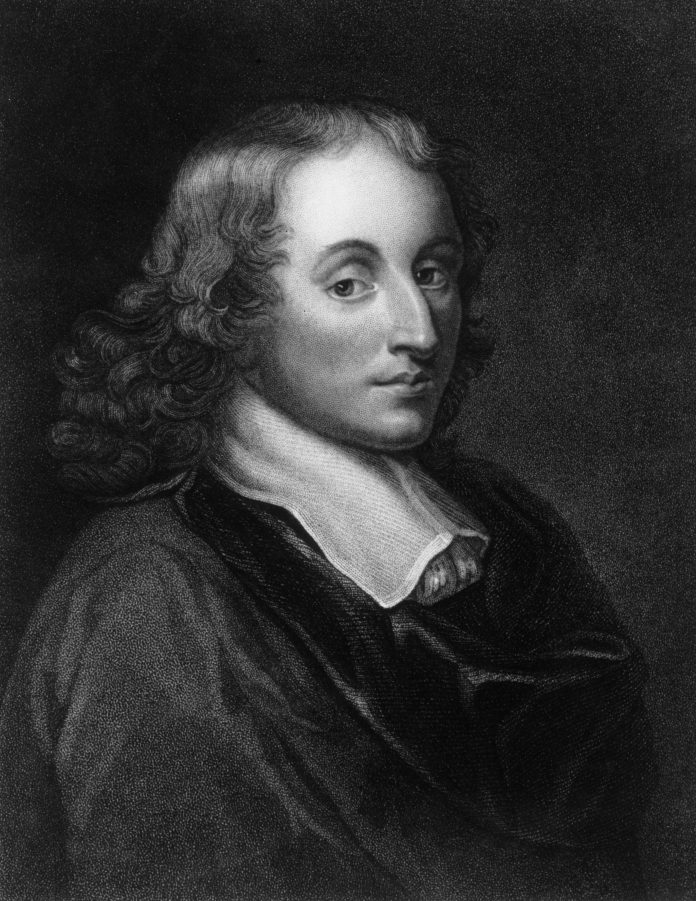In 1654, at the age of thirty, the mathematician, philosopher and theologian Blaise Pascal had a near brush with death when the horse-drawn carriage in which he was riding nearly fell off and dangled from the edge of a bridge. The incident produced a profound nervous reaction in him, which resulted in one of those great awakenings that often follow traumatic events. Pascal discovered the nearness of God. His former work now seemed not so important, and his past life of self-indulgence no longer appealed to him.
Between this brush with death, and before his actual death, Pascal penned nearly a thousand reflections on scraps of paper. These he hoped to develop into an elaborate book titled Defense of the Christian Religion. He died before he could finish the project, but his notes were discovered, organized, and published under the title Pensées (Thoughts). The most famous passage in the book has come to be called Pascal’s Wager (Thought # 233) addressed specifically to atheists and agnostics.
Abandoning the traditional proofs, which are persuasive with many people but never entirely persuasive with atheists, Pascal decided that the more sensible way to help the skeptic find God would be through the reasons of the heart, rather than those of the head. Even from the motive of sheer self-interest, the atheist might see more by believing rather than by not believing. In brief, the stakes being so high, the atheist should gamble on God rather than No-god.
As Pascal put it:
If you gain, you gain all. If you lose, you lose nothing. Wager then, without hesitation, that He exists…. At each step you take on this road, you will see so great certainty of gain, so much nothingness in what you risk, that you will at last recognize that you have wagered for something certain and infinite, for which you have given nothing.
This proposal of Pascal certainly has some appeal on certain levels. Pascal’s Wager would perhaps be especially the kind of thought an atheist might have in a foxhole on the battlefield, or at the hour of his death after a long illness. After all, deathbed conversions to Christ are famously commonplace.
One objection raised against the Wager is that it is not genuine belief if it only involves the pursuit of self-interest rather than the love of God. This objection can be answered just by pointing out that love between a man and a woman, for example, comes not immediately, but rather in the due course of time just by realizing (believing) that there is someone there to love, and by that love, one may satisfy one’s own self interest of not only loving, but being loved. As that kind of love matures, one realizes in the fullness of time that it is not illusory but real; real to the point of sacrificing one’s life for the beloved. Christian martyrs are proof that this kind of love emulates the love of He who said there is no greater love than this, that one lays down one’s life for a friend.
Pascal considered it a feeble objection to raise against the decision to choose a religion, that one might choose the wrong religion and be damned for doing so. It is true that one might opt for a false religion, but it is also true that one might, by a reasonable comparison of many religions, find the true one. It is not wisdom to sit safely on the fence, refusing to choose any religion on the principle that God is going to favor those who refuse to choose. Indeed, by refusing to choose, one has already gambled on the notion that picking no religion is safer than picking a false one.
Pascal, a keen psychologist for his day, recognized that will, rather than intellect, is behind every decision. The atheist must overcome his lack of will to find God. As Pascal put it,
The will is one of the principal organs of belief…. The will, which prefers one [choice] to another, dissuades the mind from considering those aspects it doesn’t like to see.
The inevitable inference to be drawn from Pascal’s insight is that the atheist needs to know first and foremost what it is about those aspects of God that he “doesn’t like to see.” However, first the atheist must will to see what he doesn’t like to see. What is it in the deep recesses of his will that prevents him from desiring to know and to love God?
And doesn’t he have a vested interest to find out?
The atheist philosopher Bertrand Russell once noted that Pascal’s wager argument for God seemed to him fallacious, yet I have found nowhere in his writings a cogent refutation of the wager argument, only offering the surly remark that God had failed to provide sufficient reason for belief. Perhaps that was because Pascal had the near death experience, whereas Russell had not. Russell’s logic was purely cerebral, whereas Pascal’s was profoundly existential.
Whether to be or not to be…not just now, but forever.










